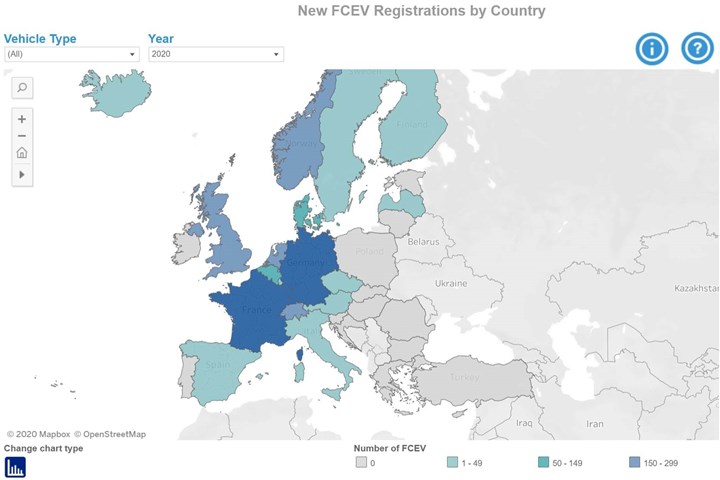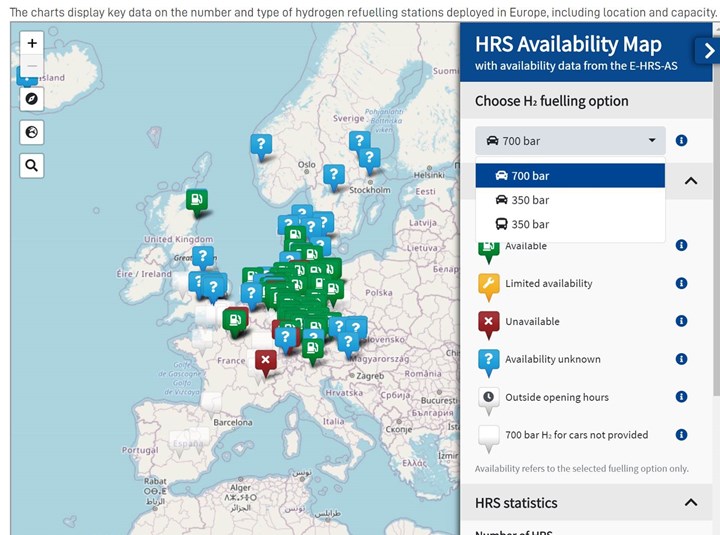European consortium launches online hydrogen market database
The Fuel Cell Hydrogen Observatory (FCHO) provides technology and market statistics and other data on the hydrogen sector.

The Fuel Cell Hydrogen Observatory (FCHO), a commission of the Fuel Cells and Hydrogen Joint Undertaking (FCH 2 JU) involving consortium partners E4Tech (Lausannne, Switzerland and London, U.K.), Hydrogen Europe, HGF, NEN, Innovation Loop and Inycom, provides data and up-to-date information about the entire hydrogen sector. It focuses on technology and market statistics, socio-economic indicators, policy and regulation, as well as financial support.
After a virtual launch event on Sept. 15, the Observatory is now available at www.fchobservatory.eu and all FCHO related updates will be also shared via its Twitter and LinkedIn accounts.
Fuel cells and hydrogen technologies are now seen as a firm part of public strategies to drive the climate-neutral revolution envisaged in the European Green Deal and to decarbonize the economy.
According to FCHO, a rising interest in fuel cells and hydrogen technologies, driven by efforts toward decarbonization and a climate-neutral economy, required filling in of knowledge gaps and an analysis of the entire value chain. The FCHO says it provides rich synthesis and data interpretation of the entire hydrogen industry and is designed to engage directly with policy-makers and experts, industry players and investors, and the general public.
The project’s goal is to collect data from primary sources and present them in an accessible and practical way. Data collected through the Observatory will be used to produce and regularly disseminate digestible analytical reports to make annual comparisons assessing market progress and identify strengths and trends in the fuel cells and hydrogen sector.

“By providing data and fact-based information about hydrogen technologies in a single database, the FCHO brings an invaluable contribution to the whole sector,” says Bart Biebuyck, executive director of the Fuel Cells and Hydrogen Joint Undertaking. “The FCHO fills an important gap as, for the first time, a tool has been made available that allows tracking in a coordinated way the effective deployment of FCH technologies, their market penetration, as well as the existing policy framework. We will continue working hard to ensure that the Observatory scope continues to grow.”
“E4Tech is pleased to lead an expert consortium in the development of the Fuel Cell & Hydrogen Observatory,” adds David Hart, director of E4Tech. “At such a pivotal time for the industry, it has never been more important for policymakers, other stakeholders and the general public to be able to access accurate information around the current status of market development, the impact of policy and the overall progress of the sector.”
“As the leading association of the sector, Hydrogen Europe is delighted to be part of the Observatory and help collect, analyze and publish data for the use of not only the fuel cells and hydrogen stakeholders but also for the general public,” says Nicolas Brahy, director of Hydrogen Europe.
Related Content
-
JEC World 2023 highlights: Recyclable resins, renewable energy solutions, award-winning automotive
CW technical editor Hannah Mason recaps some of the technology on display at JEC World, including natural, bio-based or recyclable materials solutions, innovative automotive and renewable energy components and more.
-
Composites end markets: Batteries and fuel cells (2024)
As the number of battery and fuel cell electric vehicles (EVs) grows, so do the opportunities for composites in battery enclosures and components for fuel cells.
-
NCC reaches milestone in composite cryogenic hydrogen program
The National Composites Centre is testing composite cryogenic storage tank demonstrators with increasing complexity, to support U.K. transition to the hydrogen economy.

.jpg;width=70;height=70;mode=crop)













